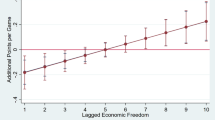Abstract
This paper investigates the connection between Turkish industrial production growth and the success of Beşiktaş, which is a popular Turkish soccer team. The empirical evidence provided in the paper suggests that industrial production growth tends to increase with the success of Beşiktaş in European cups. Moreover, if the winnings are in displacement, the increase in industrial production is higher than if the winnings are in the home field. On the other hand, findings on the effects of domestic games on industrial performance are not statistically significant.
Similar content being viewed by others
References
Alesina A. andSachs J., “Political Parties and the Business Cycle in the United States, ‘1948-1984’”,Journal of Money Credit and Banking, 1988,20(1), pp. 63–82.
Berument H., Kilinc Z., andYucel E.M., “Business Cycles in Turkey and European Union Countries”,Sosyo Ekonomi, 2005,1(1), pp. 11–26.
------, “Long Live Fenerbakçe: Production Boosting Effects of Football in Turkey”,Journal of Economic Psychology, forthcoming 2005.
Coates D. andHumphreys B.R., “The Growth Effects of Sports Franchises, Stadia, and Arenas”,Journal of Policy Analysis and Management, 1999,14(4), pp. 601–24.
—, “The Economic Impact of Postseason Play in Professional Sports”,Journal of Sports Economics, 2002,3(3), pp. 291–99.
Enders W.,Applied Econometric Time Series, New York: John Wiley, 1995.
Ergun M., “Electoral Political-business Cycles in Emerging Markets: Evidence from Turkey”,Russian and East European Finance and Trade, 2000,36(6), pp. 6–32.
FEdEral Reserve Bank of St. Louis,International Economic Trends, Annual Edition, 2002, July 2002.
Frey B.S. andStutzer A., “What Can We Learn from Happiness Research?”,Journal of Economic Literature, 2002,40, pp. 402–35.
Heckelman J.C. andBerument H., “Political Business Cycles and Endogenous Elections”,Southern Economic Journal, 1998,64(4), pp. 987–1000.
Hermalin B.E. andIsen A.M., “The Effect of Affect on Economic and Strategic Decision Making”, mimeo, 2000.
Isen A.M., “Positive Effect and Decision Making”, in M. Lewis and J.M. Haviland, eds.,Handbook of Emotions, 2nd ed., New York: The Guilford Press, 2000.
Ito T. andPark J.H., “Political Business Cycles in the Parliamentary System”,Economics Letters, 1988,27(3), pp. 233–38.
Kenny C., “Does Growth Cause Happiness, or Happiness Cause Growth?”,Kyklos, 1999,52(1), pp. 3–26.
McCallum B.T., “The Political Business Cycle: An Empirical Test”,Southern Economic Journal, 1978,44(3), pp. 504–15.
Miller T., “Televisualization”,Journal of Sport and Social Issues, 1999,23(2), pp. 123–25.
Sert M.,Scorer Is Winner: A Sociological View on Soccer (in Turkish), Istanbul: Baglam Yayinlari, 2000.
Siegfried J. andZimbalist A., “The Economics of Sports Facilities and Their Communities”,Journal of Economic Perspectives, 2000,14(3), pp. 95–114.
Spector P.E.,Job Satisfaction: Application, Assessment, Cause, and Consequences, Thousand Oaks, CA: Sage, 1997.
TanrIkulu A.,History of Beşiktaş with Legends, Heros and Numbers, (in Turkish), 2nd ed., Istanbul: Yapi Kredi Publishing, 2002.
Warr P., “Well-being and the Workplace”, in D. Kahneman, E. Diener, and N. Schwarz, eds.,Well-Being: The Foundations of Hedonic Psychology, New York: Russell Sage Foundation, 1999, pp. 392–412.
Wright T.A., Cropanzano R., Denney P.J., andMoline G.L., “When a Happy Worker is a Productive Worker: A Preliminary Examination of Three Models”,Canadian Journal of Behavioral Science, 2002,34(3), pp. 146–50.
Author information
Authors and Affiliations
Corresponding authors
Additional information
All the views expressed in this paper belong to the authors and do not represent the views of the Central Bank of the Republic of Turkey or its staff. Beşiktaş, established in 1903, is one of the most popular soccer teams in Turkey. Detailed information about the team can be reached at http://www.besiktasjk.com
Rights and permissions
About this article
Cite this article
Berument, H., Ince, O. & Yucel, E.M. Success in soccer and economic performance: Evidence from beŞİktaŞ-Turkey. RISEC 53, 260–274 (2006). https://doi.org/10.1007/BF03029588
Issue Date:
DOI: https://doi.org/10.1007/BF03029588




